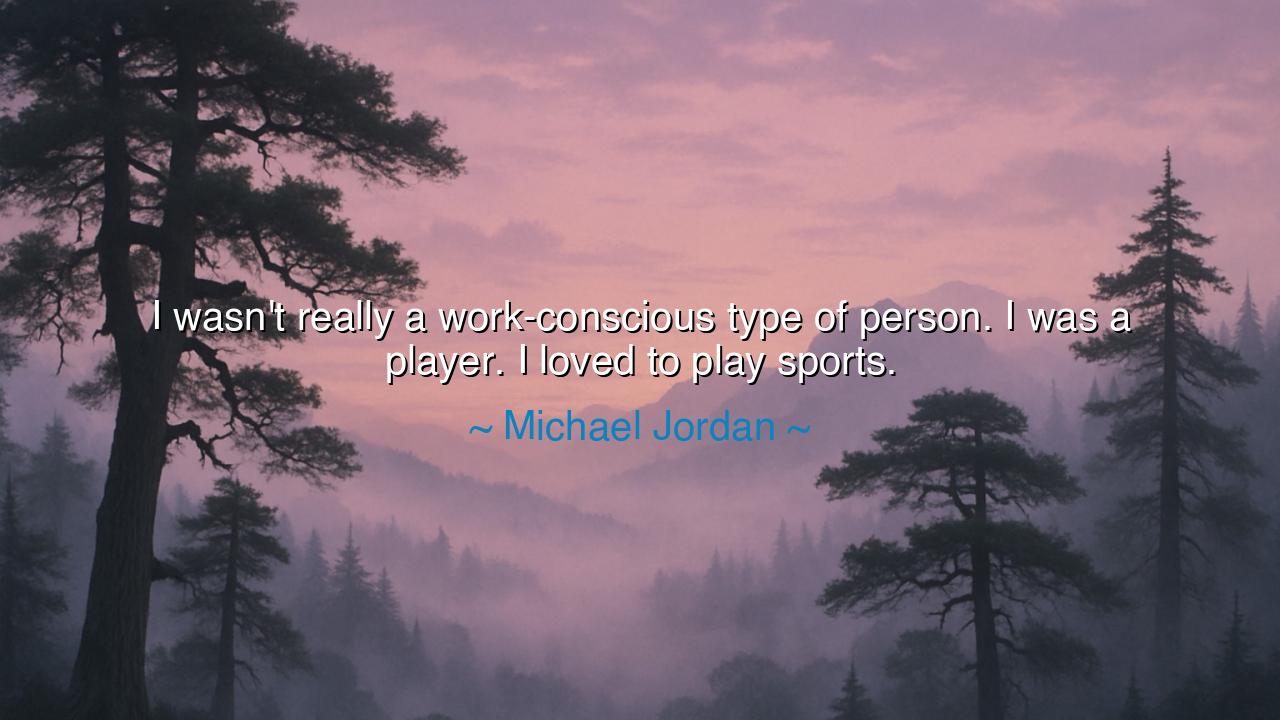
I wasn't really a work-conscious type of person. I was a player.
I wasn't really a work-conscious type of person. I was a player. I loved to play sports.






The legendary athlete Michael Jordan once reflected on his youth with these words: “I wasn't really a work-conscious type of person. I was a player. I loved to play sports.” At first glance, this statement may appear simple, a casual admission of a carefree approach to work. Yet within it lies a profound truth: passion and joy can serve as the wellspring of excellence. Jordan reminds us that the heart that loves what it does transforms effort into play, and in that transformation, greatness is born.
This quote reveals a timeless principle: the fusion of passion and skill. Jordan did not begin with a rigid sense of duty or obligation; he began with delight in the game itself. In the arena of sport, as in life, those who pursue their craft with love rather than compulsion cultivate resilience, creativity, and brilliance. The ancients understood this: Plato and Aristotle both celebrated the harmony of joy and discipline, recognizing that when the spirit delights in its labor, mastery follows naturally.
History offers many examples of this truth. Consider Leonardo da Vinci, who approached art and science not as tasks but as endless play. His notebooks are filled with experiments, sketches, and observations driven by curiosity and wonder. Though he labored tirelessly, his work was born of delight, not obligation—a joy mirrored in Jordan’s reflection. In both cases, excellence is inseparable from the love that propels it.
The meaning of Jordan’s words also illuminates the power of intrinsic motivation. He was not compelled by external rewards or pressures; his drive was internal, fueled by the joy of competition, the thrill of challenge, and the desire to test his limits. To be a “player” is to embrace the spirit of engagement, to meet obstacles with energy, and to treat challenges as opportunities rather than burdens. In this, Jordan offers a blueprint for how to achieve greatness: let love of the craft be the guide, and the results will follow.
Even in modern examples beyond sport, the principle holds. Steve Jobs, in his earliest ventures, was not simply motivated by profit but by a passion for design, innovation, and technology. His love for the work he did allowed him to surpass competitors, anticipate trends, and shape the lives of millions. Jordan’s statement, though rooted in athleticism, mirrors this universal truth: joy in the pursuit transforms labor into mastery.
The lesson for life is both practical and profound: seek what you love, pursue it with dedication, and let enthusiasm guide your efforts. Practical action is simple: identify the activities that ignite your passion, dedicate yourself to them with focus and energy, and allow the enjoyment of the process to fuel perseverance. In so doing, you align work with purpose, and effort becomes play, even when the stakes are high.
Thus, Michael Jordan’s quote endures as wisdom for all generations. It teaches that mastery is born not from obligation alone, but from joy and engagement; that play, when pursued with dedication, becomes the path to excellence; and that the heart’s delight can transform labor into legend. Let us embrace our own passions, and approach our endeavors as players in the grand game of life, knowing that greatness arises naturally when we love what we do.






AAdministratorAdministrator
Welcome, honored guests. Please leave a comment, we will respond soon